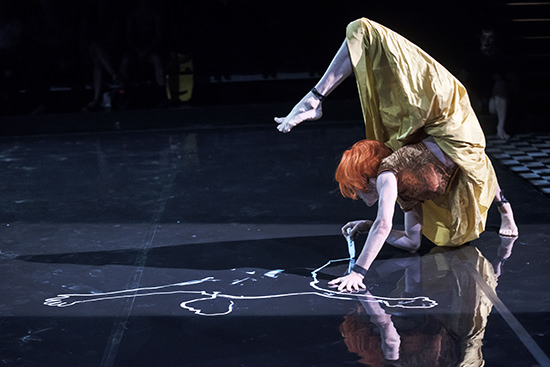Can acrobatics liberate Modernism’s heroines?
Kathryn Kelly: Circa & La Boite, When One Door Closes

When one door closes, Circa
photo Dylan Evans
When one door closes, Circa
“If you are trapped in the dream of the Other you’re fucked,” says French philosopher Gilles Deleuze, quoted in Circa’s new work When One Door Closes at La Boite’s Roundhouse Theatre.
Deleuze’s words frame the major inquiry of the work: what if the three greatest heroines of modernist drama were to meet? What if Nora, Hedda and Miss Julie were acrobats? The show begins with a routine of high impact tumbling as the male acrobats use the full scope of the in-the-round configuration to run in from off-stage and collide with and cross one another. This virtuosic performance sets the benchmark for the show—stunning routines whose immediacy has been amped up with clever use of the Roundhouse space.
The mood of the work then shifts from contemporary spectacle to something more ominous. A pair of male acrobats don hats and read us a short and camp précis of each of the heroines’ trajectories in their respective plays. Each introduction culminates with the quotation from Deleuze. The polemic is simple but powerful—the women are trapped, not only by the structural injustice of the othering that arises from their original contexts but in this dream world too where they must navigate their own desires and vices.
The first three routines by each of the women are electric, particularly one by the orange-haired contortionist Bridie Hooper as Hedda, who chalks the floor with the outline of her dead body. These solo pieces with the individual women in striking colour-blocked costumes (pink/red/orange) are contrasted with male choral routines—indistinguishable husbands, clad in blue, wearing bright-red lipstick.

When one door closes, Circa
photo Dylan Evans
When one door closes, Circa
The score by Oonagh Sheppard is cinematically atmospheric and underpins the intriguing concept—how will the highly psychological characterisation of these women be expressed in circus form? Suddenly, the show changes trajectory and the dreamlike atmosphere is shattered by the fall of the black silk that covers the circus apparatus hidden in the rigging above. What follows are some extraordinary routines: playful duos of dominance and subjugation built around lollies, undies and bags of flour; whole company set pieces where a single performer carries the entire cast; and a mournful clean-up of the dirtied stage as a ratty old office chair spins in the centre holding two performers miming to the sounds of a vacuum cleaner carried on the back of one of the performers like an old-fashioned carnival instrument.
Circa never fails to deliver this supremely entertaining yet edgy aesthetic and the audience relishes every moment. Yet somehow the original promise of the work disappears. The women do not meet again in a routine until the climax. Indeed it is the charismatic male performers who take centre-stage. While this is interesting too—the burden of otherness expressed through the male body, the power of camp to disturb traditional gender assumptions—I still mourned a missed opportunity to fully interrogate the delicious premise of the show: three of our boldest heroines trapped in a room together.

When one door closes, Circa
photo Dylan Evans
When one door closes, Circa
La Boite Theatre Company & Circa: When One Door Closes, creator Yaron Lifschitz, Libby McDonnell & the Circa Ensemble, directors Yaron Lifschitz, Libby O’Donnell, dramaturg Todd MacDonald, set design, lighting Jason Organ, costumes Libby MacDonnell, composer Oonagh Sheppard; Roundhouse Theatre, Brisbane, 6-23 April
RealTime issue #132 April-May 2016






